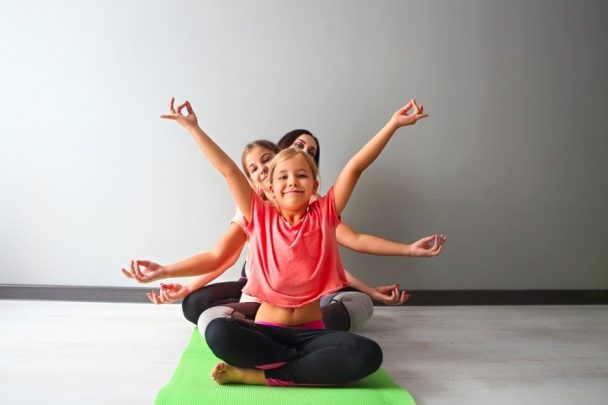Description
Developed in ancient India, the practice of yoga has become increasingly popular in Western culture, recognized for its health benefits and important philosophical teachings for our modern world.
Yoga is a holistic approach to wellness, adaptable for people of different ages, abilities, backgrounds, and religions. Even children can benefit from a consistent yoga practice, whether as a part of their school day or as an after-school activity.
Yoga and meditation have proven health benefits – for greater physical, mental, and social well-being. Over time, regular yoga practice can lead to increased energy, flexibility, attention span, and self-esteem.
Practicing yoga helps us to liberate and control our emotions, approach daily challenges with confidence, and find a renewed appreciation for the environment. Not to mention, yoga and meditation offer children and adults a moment of rest and a break from their busy schedules.
Through yoga, children learn values such as gratitude and respect – important teachings for daily life in and out of the classroom. In this course, teachers will learn to integrate yoga, meditation, and mindfulness education into their own curricula, no matter what subject they teach, and with no need for former yoga experience.
What is included
Learning Outcomes
This course will help participants to:
- Deepen self-awareness;
- Awaken physical, psychological, and social potential through play and exercise;
- Stimulate creativity, self-expression, curiosity, and intuition;
- Develop a more loving and respectful relationship with nature and with others;
- Promote greater attention and achievement in school;
- Alleviate stress and anxiety.
Tentative Schedule
Day 1 – Intro to Yoga
- Intro to yoga philosophy and how to explain it to children;
- Defining yoga terms: yama, nyama, asana, pranayama, pratyahara, dharana, dyana, samadhi, chakra, savasana, namaste;
- Meditation and mindfulness. Pranayama: breathing exercises.
Day 2 – Yoga in practice
- Warm-up exercises;
- Designating a time and space: the raft;
- Games for getting to know each other, for greetings, for connection;
- Learning the asanas: nature theme (seed, tree, flowers, seasons).
Day 3 – Yoga games
- Guided meditation exercise;
- Games for concentration, for building trust, for letting off steam, for calming down;
- Learning the asanas: animals theme (cat, cow, puppy, lion’s breath, monkey, frog, turtle, birds).
Day 4 – Yoga stories
- Emotional education: yoga stories for children;
- Games for reviewing poses: yoga cards, yoga freeze tag, yogi says;
- Activity: yoga for happiness;
- Teamwork: back-to-back breathwork, and trust exercises.
Day 5 – Yoga for classroom management
- Activity: yoga for anger management (story of Ganesh);
- Thematic asanas: choose an emotion, and make a sequence according to that emotion (other themes include the four seasons, farmhouse animals, jungle animals, etc.);
- Participants take turns leading the group in yoga sequences.
Day 6 – Course closure and cultural activities
- Course evaluation: round-up of acquired competencies, feedback, and discussion;
- Awarding of the course Certificate of Attendance;
- Excursion and other external cultural activities.







